All Management News
- MSV-IV with Shaik Rajak November 27, 2021
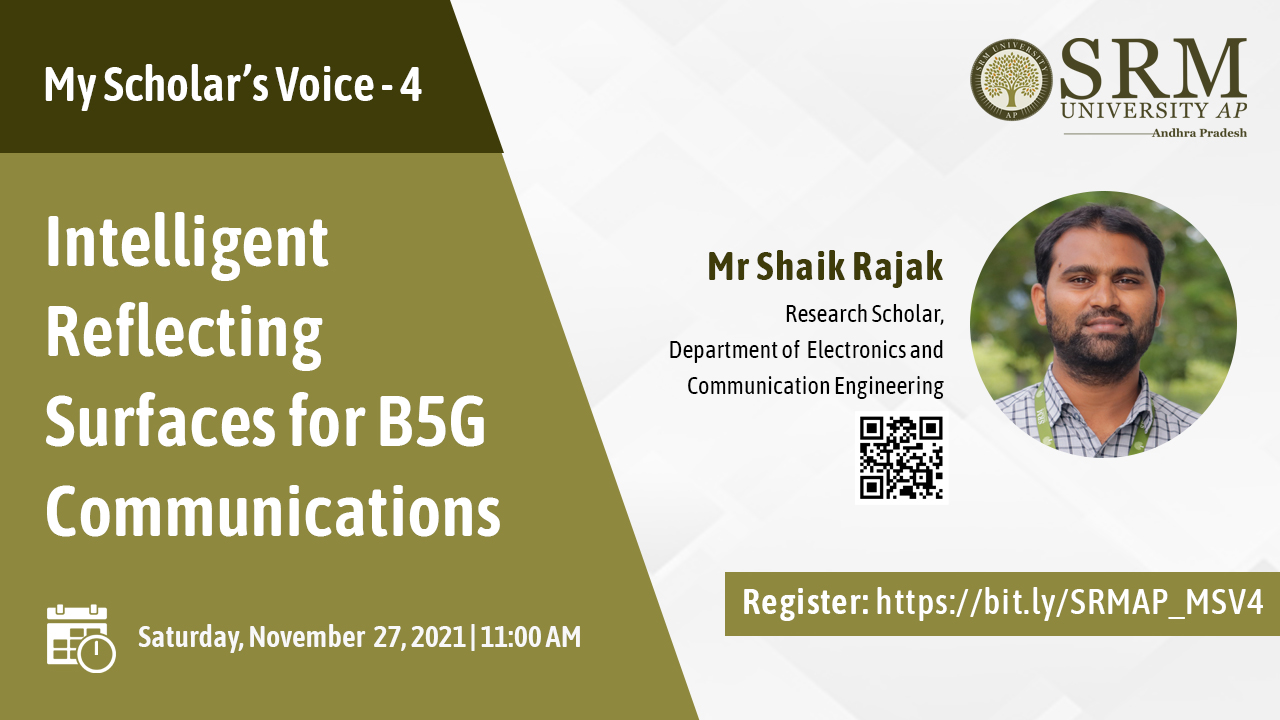 The world of communications is constantly changing. It is transforming, evolving, and becoming better, faster, and smarter. So, for the fourth edition of My Scholar’s Voice (MSV-IV) we would like to present Shaik Rajak from the Department of Electronics and Communications Engineering for a titillating discussion on “Intelligent Reflecting Surfaces for B5G Communications” on Saturday, November 27, 2021, at 11.00 am.
The world of communications is constantly changing. It is transforming, evolving, and becoming better, faster, and smarter. So, for the fourth edition of My Scholar’s Voice (MSV-IV) we would like to present Shaik Rajak from the Department of Electronics and Communications Engineering for a titillating discussion on “Intelligent Reflecting Surfaces for B5G Communications” on Saturday, November 27, 2021, at 11.00 am.Shaik Rajak will give us an insight into the future with communications with his talk. He will elaborate in this session on the importance of his research. He will talk about the scopes of implementation as well as further research that can follow his work. It would be really beneficial to learn about the developing phase of communication research to make an informed decision while choosing research or career plans.
About the speaker:
Shaik Rajak received his B. Tech degree in Electronics and Communication Engineering from JNTU, Hyderabad in 2013. He completed his M.Tech. in Electronics and Communication Engineering, JNTU Hyderabad in 2016 and is currently working towards the PhD at the School of Engineering And Science (SEAS), SRM University-AP, Andhra Pradesh, India. Before joining SRM University-AP, he worked as a lecturer for a year in QIS College of Engineering and Technology (QISCET), Andhra Pradesh. He was awarded a gold medal for the paper presentation organized by SRM University-AP. His current research interests include the Internet of Things, beyond 5G communications, Intelligent Reflecting Surfaces, Millimeter-wave, Massive MIMO, OMA, and NOMA schemes.
So, take a seat and be a part of this amazing session on Saturday, November 27, 2021, at 11.00 am to hear from Shaik Rajak’s voice in MSV-IV.
Continue reading → - Destressing the anxious nerves with Test Anxiety and Learning Styles Session 2 November 25, 2021
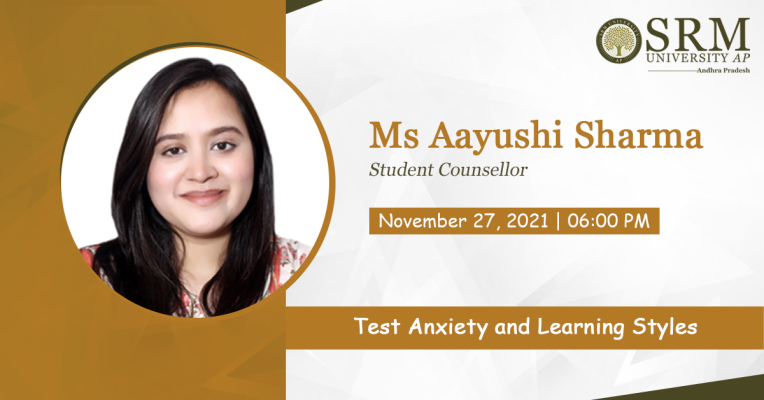 Shivering with the change of weather is welcome. Trembling with nerves is not. So, if the upcoming tests are making you anxious and jittery, then the second session of Test Anxiety and Learning Styles would be an excellent opportunity to take a deep breath before the sprint.
Shivering with the change of weather is welcome. Trembling with nerves is not. So, if the upcoming tests are making you anxious and jittery, then the second session of Test Anxiety and Learning Styles would be an excellent opportunity to take a deep breath before the sprint.Ms Aayushi Sharma, Student Counsellor, will coordinate the session on November 27, 2021, at 6.00 pm. This session would be greatly useful to the students and help them understand how to use the benefits of tests to combat test anxiety. A test is more than marks and rankings. It is for finding gaps in our knowledge, for devising methods that work the best for us, and, most importantly, for learning management at the most basic interpersonal level so that we might transfer these skills to our professional lives one day.
Tune in on November 27, 2021, at 6.00 pm for an engaging, interactive and informative second session on Test Anxiety and Learning Styles with Ms Aayushi Sharma, to arm yourselves and head-on to the test tomorrow and the challenges ever after.
Continue reading → - Rs. 44 lacs fund from SERB-DST for functionalized alkene preparation strategy November 25, 2021
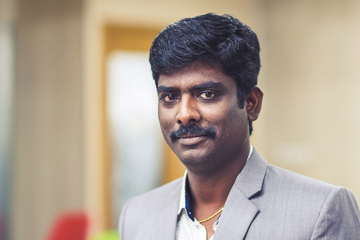 Prof S Mannathan has added SRM University-AP to the list of those research-oriented Universities which try to direct their research to make the world a better place. With this new SERB-DST project of Rs. 44 lacs fund, Dr Mannathan and his team will be able to investigate into developing a strategy to prepare functionalized alkenes in a manner that is pro-environment and industrially economic.
Prof S Mannathan has added SRM University-AP to the list of those research-oriented Universities which try to direct their research to make the world a better place. With this new SERB-DST project of Rs. 44 lacs fund, Dr Mannathan and his team will be able to investigate into developing a strategy to prepare functionalized alkenes in a manner that is pro-environment and industrially economic.Why functionalized alkenes? Alkene is a hydrocarbon with a C=C bond. It is readily available and a fan favourite among chemists. It reacts favourably with a variety of reactants and is a preference in the synthesis of bioactive compounds. This procedure aids in the preparation of several valuable compounds with a variety of uses from the manufacturing of antidepressants to the treatment of cancer.
What Prof Mannathan says about the project:
“We intend to develop a highly efficient, low-cost, environmentally-friendly strategy to prepare functionalized alkenes in a highly regio- and stereoselective manner. A step- and atom economic reductive coupling strategy will be employed by using a photoredox and a low valent metal dual catalyst to prepare such molecules. This novel approach avoids the use of any external reducing agent and generates the low valent metal species in situ using a photocatalyst.”
Dr Mannathan was granted a total of Rs. 44,11,264 for a period of 3 years. Dr Mannathan believes that with a SERB sanctioned fund of Rs. 44 lacs, he and his team will be able to design a new and revolutionary protocol. The newly designed protocol could be useful in the synthesis of various biologically active molecules and natural products such as aigialomycin D which is a helpful compound in inhibiting protein kinases that are related to cancer pathways.
Continue reading → - Semester Abroad Programme at James Cook University, Singapore November 24, 2021
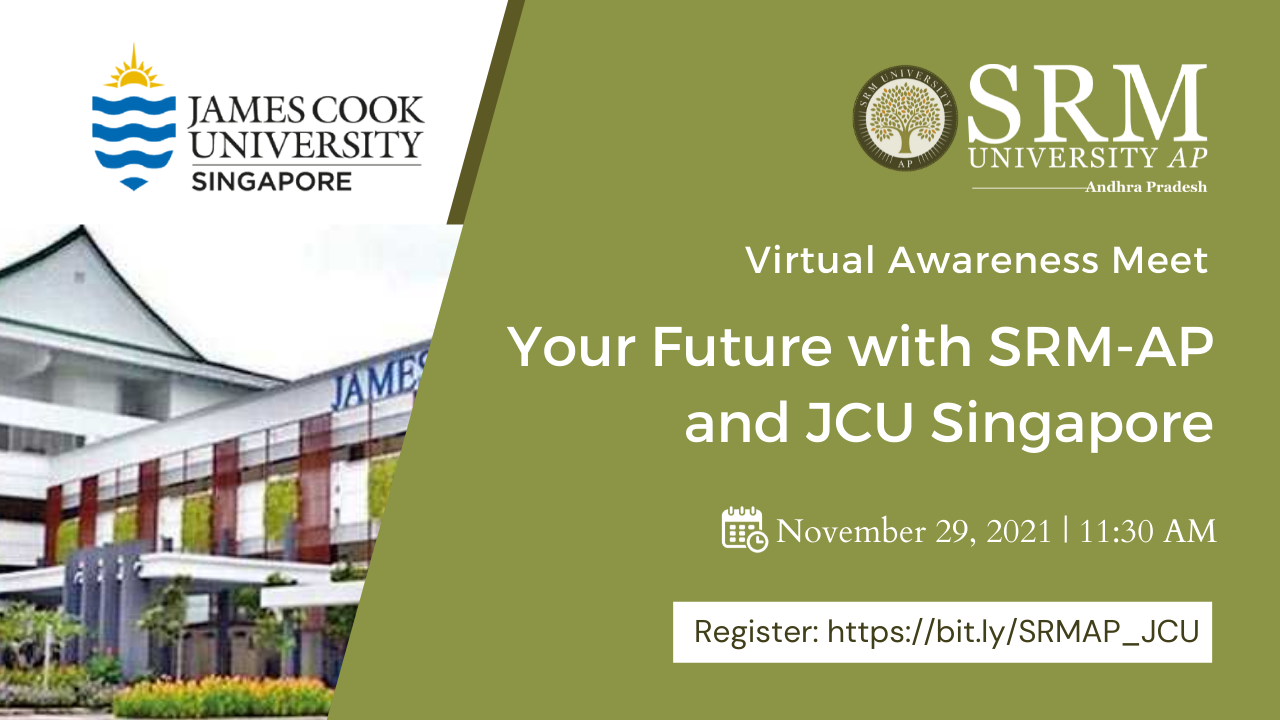 Discover top universities from around the world in the free virtual events organised by the Office of International Relations and Higher Studies, SRM University-AP! This time, we are organising an online awareness programme with one of our partner universities James Cook University (JCU), Singapore. Official representatives from JCU will do presentations on the Semester Abroad Programme offered to the students of SRM University-AP on November 29, 2021, at 11.30 am (IST).
Discover top universities from around the world in the free virtual events organised by the Office of International Relations and Higher Studies, SRM University-AP! This time, we are organising an online awareness programme with one of our partner universities James Cook University (JCU), Singapore. Official representatives from JCU will do presentations on the Semester Abroad Programme offered to the students of SRM University-AP on November 29, 2021, at 11.30 am (IST).Studying at the Singapore campus of James Cook University allows exploring the rest of Asia along with their high-quality Australian education. The Semester Abroad Programme enables students to learn for 1 or 2 Trimesters (4 or 8 months), earning credits towards their home institution degree. As a Semester Abroad student at James Cook University, our students will be able to choose subjects from a wide range of study areas that will add value to their degree and broaden their experience.
From networking sessions to university fairs to seminars and panels, the Office of International Relations and Higher Studies is the ultimate way to find your way to study abroad! Stay tuned to this awareness programme on November 29, 2021, at 11.30 am (IST).
Continue reading → - Top 5% most cited author: Royal Society of Chemistry November 23, 2021
 SRM University-AP could not be more proud to announce that Dr S Mannathan, Head of Department of Chemistry has made it to the top 5% in the list of the Most Cited Authors by the Royal Society of Chemistry. It is inspiring to have a faculty member in our midst whose work has helped and facilitated the research of so many others.
SRM University-AP could not be more proud to announce that Dr S Mannathan, Head of Department of Chemistry has made it to the top 5% in the list of the Most Cited Authors by the Royal Society of Chemistry. It is inspiring to have a faculty member in our midst whose work has helped and facilitated the research of so many others.Dr Mannathan obtained his doctorate from National Tsing Hua University, Taiwan. His research interests primarily lie in Metal-catalyzed organic transformation reactions, Multicomponent reactions, and Asymmetric synthesis. His research followed by scientists all over the world leading him to become one of the top 5% authors in terms of citations
In the field of Transition Metal Complexes as Catalysts in Organic Reactions, he particularly leans towards ‘Nickel-and cobalt-catalyzed three-component coupling and reductive coupling reactions’, and ‘Palladium-catalyzed reductive arylation’. Similarly, in Asymmetric Synthesis, he favours research into ‘Asymmetric reductive Heck reaction for the synthesis of chiral indanones’, and ‘Synthesis of bicyclic tertiary alcohols and its related asymmetric version via reductive [3+2] cycloaddition reaction by using chiral cobalt complexes.’
About the top 5% most cited paper:
In this work, he reported the synthesis and application of a Zn-Bp-BTC MOF (Bp – 4,4′-bipyridine; BTC – 1,3,5-benzene tricarboxylic acid; MOF – metal organic framework) as a heterogeneous catalyst for mediating organic reactions. Initial reaction conditions were optimized for the Knoevenagel condensation reaction using Zn-Bp-BTC as a heterogeneous catalyst. Various factors such as the effect of solvent, temperature and catalyst loading were evaluated. Although the reaction proceeded at room temperature using methanol as the solvent, 60 °C offered the best yield in a shorter duration. Under optimized reaction conditions, a wide range of α,β-unsaturated dicyano compounds were prepared from the corresponding carbonyl precursor and malononitrile, the active methylene counterpart. A systematic investigation was also carried out to assess the role of the ligand and metal salt in the Knoevenagel condensation reaction. It was found that the Zn-Bp-BTC MOF catalyzed the reaction efficiently in comparison to its analogue Zn-BTC MOF and precursor Zn(NO 3 ) 2 ·6H 2 O. Finally, catalytic recycling and stability studies showed that the catalyst is able to mediate the reaction for up to five consecutive cycles without undergoing any significant chemical or morphological changes. Further, the catalyst was tested for its efficacy in a multicomponent reaction (MCR). An MCR with the Zn-Bp-BTC MOF as the catalyst afforded good yields and there was no reaction in the absence of the catalyst. Similarly, the catalyst was tested for its efficiency in benzimidazole synthesis.
Dr Mannathan did this research in collaboration with Dr. Kathiresan Murugavel, Scientist, Electro Organic Division, CSIR-Central Electrochemical Research Institute (Govt of India), Karaikudi.
Continue reading → - Jairam Ramesh: On the journey of writing November 23, 2021
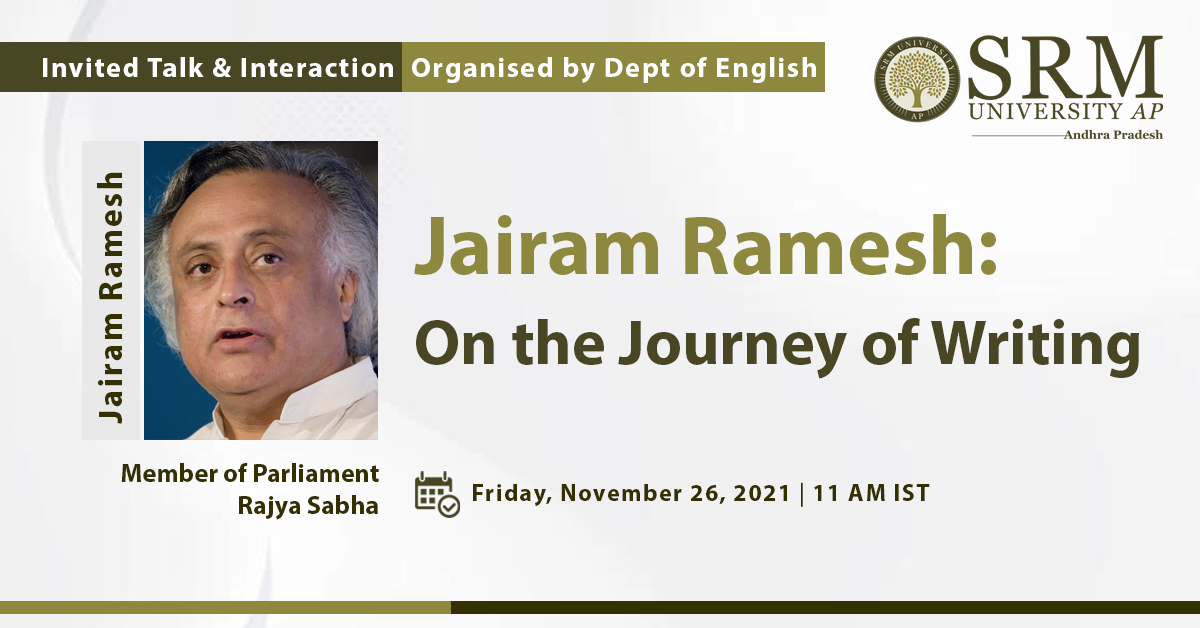 The Department of English at SRM University-AP invites you to an engaging webinar on November 26, 2021, at 11.00 am. Mr Jairam Ramesh, Member of Parliament representing the state of Andhra Pradesh, will be the guest speaker of the day.
The Department of English at SRM University-AP invites you to an engaging webinar on November 26, 2021, at 11.00 am. Mr Jairam Ramesh, Member of Parliament representing the state of Andhra Pradesh, will be the guest speaker of the day.Writing is a process of pain and pleasure. Every writer approaches, experiences, and survives it in a unique way. In this talk and interaction, Mr Jairam Ramesh would share his idea and process of writing. His talk would be followed by an interaction about his latest book The Light of Asia: The Poem That Defined The Buddha (Penguin, 2021). The talk is intended to be a part of the Department’s larger initiative to organise interactions around “Language and Society” to address all kinds of conversations about language, communication, writing, speaking, thinking, and at a deeper level, about connecting with others.
About the Speaker:
Jairam Ramesh is presently a Member of Parliament and Chairman of Parliament’s Standing Committee on Science and Technology, Environment, Forests and Climate Change. He was Union Minister between 2006 and 2014 and held several portfolios including Commerce, Power, Environment and Forests, Drinking Water and Sanitation and Rural Development. He played a key role in global climate change negotiations in 2009 and 2010. He is also the author of several well-known books some of which are Green Signals: Ecology, Growth and Democracy in India, Old History, New Geography: Bifurcating Andhra Pradesh, To the Brink and Back: India’s 1991 Story, Indira Gandhi: A Life in Nature, Intertwined Lives: PN Haksar and Indira Gandhi, A Chequered Brilliance: The Many Lives of V.K. Krishna Menon and The Light of Asia: The Poem that defined the Buddha.
We encourage you to make use of this exclusive opportunity to interact with Mr Jairam Ramesh and understand the nuances of the writing process on November 26, 2021, at 11.00 am.
Continue reading → - Dr M Durga Prakash November 22, 2021
- Detection of diabetic retinopathy (DR) severity from fundus photographs November 19, 2021
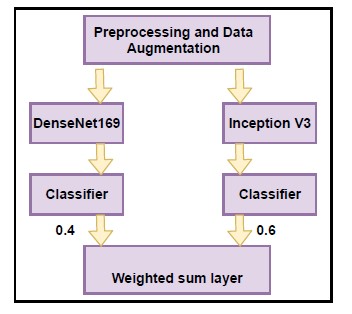 A research paper titled “Detection of Diabetic Retinopathy (DR) severity from fundus photographs: An Ensemble Approach using weighted average”, has been published by Dr Mahesh Kumar Morampudi, Assistant Professor of Computer Science and Engineering, in the Arabian Journal for Science and Engineering.
A research paper titled “Detection of Diabetic Retinopathy (DR) severity from fundus photographs: An Ensemble Approach using weighted average”, has been published by Dr Mahesh Kumar Morampudi, Assistant Professor of Computer Science and Engineering, in the Arabian Journal for Science and Engineering.Diabetic Retinopathy is a common diabetic disease that affects the retina and can result in blindness if not treated initially. Deep learning (DL) based models are proposed to detect the blood abnormalities in the retinal tissue due to diabetes mellitus obtained from fundus camera. The drawback of these models is the lack of performance. To address this, we propose to automate the process of detection of the severity of Diabetic Retinopathy (DR) using ensembles of pre-trained models, thus exploring the power of transfer learning in the field of automated diagnosis. Deep learning models perform well when the model is trained on a large amount of data. In this regard, we also put forth data augmentation and preprocessing techniques to generate synthetic images and to improve image quality. Extensive experimental results on publicly available databases illustrate that the proposed ensemble model achieves fair accuracy when compared to existing models. Thus, the proposed model shows good scope for deployment in real-time diagnosis.
Every year multiple people are diagnosed with diabetes. Diabetes is a chronic disease that affects several organs of the human body namely the eyes, kidneys, heart etc. Diabetic Retinopathy (DR) is a situation induced by diabetes in which severe loss happens to the retinal blood vessels that can ultimately lead to blindness. Regular diabetic retinopathy screening is hence needed for detecting it in advance. In the present situation, a trained clinician or an ophthalmologist is required to identify diabetic retinopathy (DR) by the existence of lesions related to the vascular abnormalities induced by the disease. The ophthalmologist needs to evaluate and examine digital colour fundus images of the retina. So, it is a very tedious and sluggish process. He/She needs more time to diagnose DR. The diagnosis of the disease by any manual means seems to be tiresome and usually results in errors. To overcome this limitation, we propose a model to automate the process of detection of the severity of DR using ensembles of pre-trained models, thus exploring the power of transfer learning in the field of automated diagnosis.
The research group believes that the study helps ophthalmologists to identify diabetic retinopathy at its early stage accurately, as a result, the chance of losing the vision due to diabetic retinopathy can be reduced. The work is done in collaboration with Dr Mulagala Sandhya, Assistant professor, NIT-Warangal. In the future, Dr Mahesh Kumar plans to work on a project related to Privacy-preserving Biometric Authentication.
Continue reading → - Level down stress and level up performance with ‘Test Anxiety and Learning Styles’ November 19, 2021
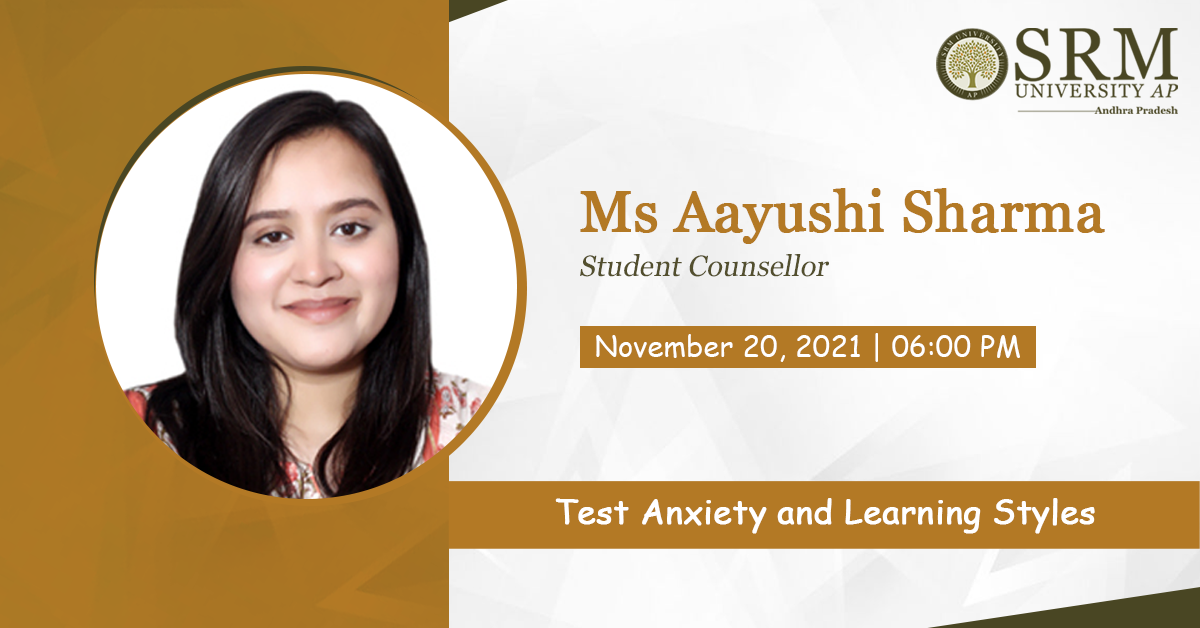 Ms Aayushi Sharma, the resident Student Counsellor, is bringing forth an exciting interactive session on Test Anxiety and Learning Styles on November 20, 2021, at 6.00 pm IST.
Ms Aayushi Sharma, the resident Student Counsellor, is bringing forth an exciting interactive session on Test Anxiety and Learning Styles on November 20, 2021, at 6.00 pm IST.With exams facing this way, the cool season could get a little sweaty unless we learn to curb our stress and anxiety. So instead of dreading the ticking clock, it is time to command it. How well we perform in examinations will depend on how well we have understood our subjects.
An examination is not a comparison with our peers but an opportunity to self-assess. It can make us aware of our weaknesses so that we can work on them. It can also serve as a chance to assess our strengths so that we might build on them. Instead of looking at examinations with a pessimistic outlook if we look at them optimistically, we might even be able to use them as tools to help us as career guides.
So do not miss this riveting talk on November 20, 2021, at 6.00 pm IST to stay on track, focused and motivated.
Continue reading → - Eminent Guest Lecture Series: An Odyssey of Physics November 19, 2021
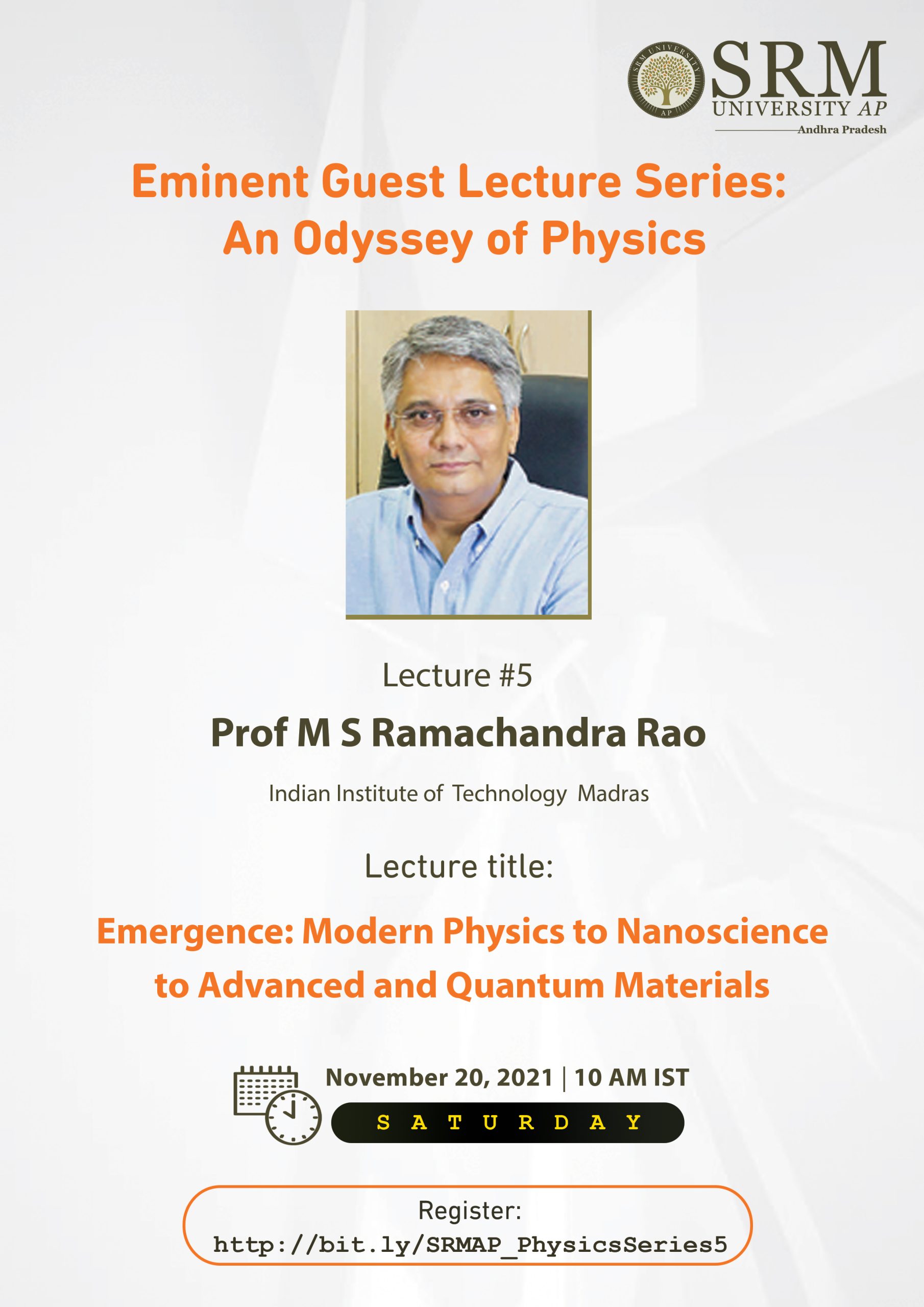 The 5th installment of the Eminent Guest Lecture Series: An Odyssey of Physics is being brought to you by the Department of Physics at SRM University-AP on November 20, 2021
The 5th installment of the Eminent Guest Lecture Series: An Odyssey of Physics is being brought to you by the Department of Physics at SRM University-AP on November 20, 2021
at 10 AM IST. Our eminent guest speaker is Dr M.S. Ramachandra Rao from the Department of Physics, Quantum Centre for Diamond and Emergent Materials (QuCenDiEM), Nano Functional Materials Technology Centre, and Materials Science Research Centre, Indian Institute of Technology (IIT) Madras.About the Speaker:
Dr Rao is one of the forerunning researchers in Physics in our country and has been invited by the Nobel Committee for Physics, Royal Swedish Academy of Sciences, to be a nominator in the years 2009 and 2021. He has authored the books “Nanoscience and Nanotechnology: Fundamentals to Frontiers” (Wiley) – Textbook. ISBN: 9788126542017 and “ZnO nanostructures and Allied Materials” (Springer).
Dr Rao obtained both his Master’s degree and Doctorate from the Indian Institute of Technology, Kharagpur. Over the course of his 26 years of teaching and research experience, he has published in over 200 national and international conference papers, 284 international journals, obtained 15 patents and four technology transfers, completed 20 projects, and delivered over 90 talks.
Dr Ramachandra Rao’s research team incubated a company in IITM Research Park (Kapindra). The company deals with diamond coating for industrial/defence/space applications. It is in the process of developing a product for water purification using diamond-coated electrodes. His team won the 1st prize in the DRDO Dare-to-Dream nationwide contest for their proposal to use diamond coatings in hypersonic technologies.
About the talk: Emergence: Modern Physics to Nanoscience to Advanced and Quantum Materials
The beginning of the 20th century has dawned a new era of modern physics with the evolution of a plethora of experimental techniques that include understanding of optical and x-ray spectra, Rutherford scattering, Stern-Gerlach experiment that led to the discovery of electron spin, with simultaneous progress in the fields of superconductivity, magnetism, spintronics, crystallography and the physics of low dimensional systems that in other words is termed as nanoscience which deals with 2D, 1D and 0D systems. We know that matter is made up of atoms, atoms make up crystal lattices, and electronic correlations play an important role in determining the physical properties of materials. I will explain the enormous progress materials science has made and the potential it offers in various technologies. I will talk about the emergence of ‘quantum materials’ and how quantum effects are inherently built-in certain material systems, for example, high-temperature superconductors. I will give examples citing potential applications of functional materials and brief about diamond, the wonder material for futuristic quantum applications.
Continue reading →

